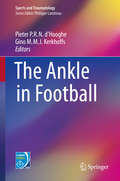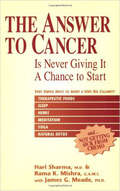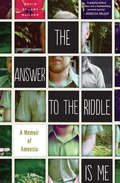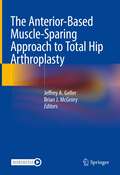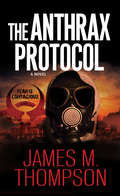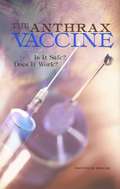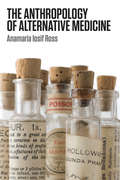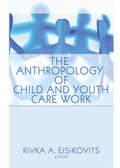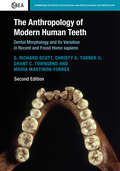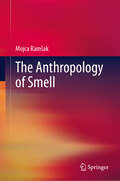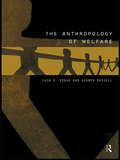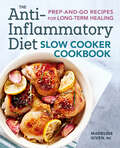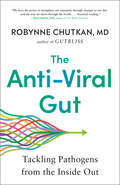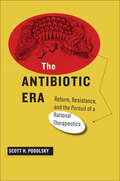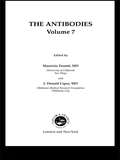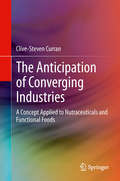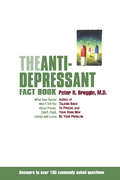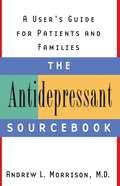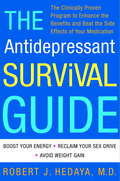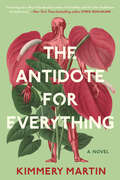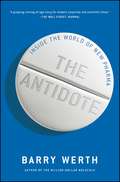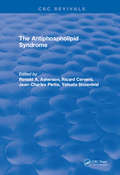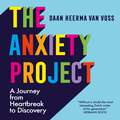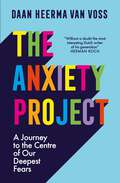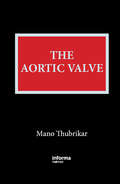- Table View
- List View
The Ankle in Football
by Gino M. M. J. Kerkhoffs Pieter P. R. N. d'HoogheThis book creates a unique platform that covers main ankle pathologies specifically related with football. Experiences from professional players have been combined with evidence-based medical content from renowned experts in the field to present a comprehensive picture on ankle injuries in football. Worldwide, ankle injuries present a high burden for sports medicine physicians, physiotherapists, players and coaches in and around the football pitch. This book contains updated content for both medical and nonmedical individuals involved with football.
The Answer to Cancer
by Hari SharmaThe public hasn't had the first clue about how to prevent cancer. This book provides that clue and more. This offers effective prevention if people follow the guidelines. -Christopher S. Clark, M. D. The Raj - Maharishi Ayurveda Health CenterCharming and fun to read. It is not just a cancer book, it gives people an opportunity to learn simple, yet powerful techniques for staying fit without tough diets or impossible workout programs. -Jay Glaser, M. D. Medical Director, Lancaster Ayurveda Medical Center. Simple, natural things are the answer to cancer! Sound too easy? Here a Western research physician teams with an Eastern Ayurvedic to explain how ancient secrets -- that you can do from home! -- make it difficult for cancer to ever get started.
The Answer to the Riddle Is Me: A Memoir of Amnesia
by David Stuart Maclean"Brilliant and painful and hilarious." --Antonya Nelson On October 17, 2002, David MacLean "woke up" on a train platform in India with no idea who he was or why he was there. No money. No passport. No identity. Taken to a mental hospital by the police, MacLean then started to hallucinate so severely he had to be tied down. Soon he could remember song lyrics, but not his family, his friends, or the woman he was told he loved. All of these symptoms, it turned out, were the result of the commonly prescribed malarial medication he had been taking. Upon his return to the States, he struggled to piece together the fragments of his former life in a harrowing, absurd, and unforgettable journey back to himself. The Answer to the Riddle Is Me, drawn from David MacLean's award-winning This American Life essay, is a deeply felt, closely researched, and intensely personal book. It asks every reader to confront the essential questions of our age: In our geographically and chemically fluid world, what makes me who I am? And how much can be stripped away before I become someone else entirely?
The Anterior-Based Muscle-Sparing Approach to Total Hip Arthroplasty
by Jeffrey A. Geller Brian J. McGroryThe minimally invasive, anterior-based muscle-sparing (ABMS) approach to total hip arthroplasty (THA) is utilized worldwide in select locations as an effective surgical technique. As the name suggests, it is completely muscle-sparing and touts the benefits of anterior-based surgery, including a lower dislocation rate, quicker return to baseline function, and lower narcotic use than many other surgical approaches. However, there is a paucity of collected information on the technique and research associated with this technique.This text serves as a compendium of information for those surgeons interested in utilizing this surgical approach as an all-inclusive reference. As an alternative anterior-based approach to the direct anterior surgical approach, some surgeons may find the technique an improved alternative for anterior hip-based surgery. Opening chapters present the history of the anterolateral approach and how to transition to the ABMS approach, including surgical anatomy. ABMS technique with the patient positioned in both the lateral and supine positions are then presented, including associated video segments. Considerations such as implant selection, fixation, and other tips and tricks are shared, along with comparisons to other approaches, patient-reported outcomes, complications and revision surgery techniques, and rehabilitation strategies.For hip surgeons looking to expand their armamentarium of surgical approaches, The Anterior-Based Muscle-Sparing Approach to Total Hip Arthroplasty is a terrific resource.
The Anthrax Protocol: A Dystopian Viral Pandemic Thriller
by James M. ThompsonIt Kills Slowly…In an excavation site in Mexico, a team of archeologists uncovers the lost tomb of Montezuma--and a deadly strain of anthrax as ancient as the Biblical plagues. One by one, the team falls violently ill, bleeding from their eyes and ears before succumbing to a slow, painful death. Whatever was buried with the Aztec chief is still active, infectious--and now airborne…It Spreads Quickly…In Austin, a young archeologist listens to the dying words of her mentor in Mexico--a warning to quarantine the site before all hell breaks loose. In Atlanta, the CDC's Dr. Mason Williams leads an emergency squad on a life-or-death mission--into the hot zone. At Fort Detrick, an army officer sends a trained team to secure the anthrax--as a biological weapon. But time is running out. The disease is spreading rapidly across the border, into the airports, and across the globe, killing thousands. With no cure, no vaccine, and no way to contain it, there will be no hope for humanity--to survive…
The Anthrax Vaccine: Is It Safe? Does It Work?
by Jane S. Durch Lois M. Joellenbeck Lee L. Zwanziger Brian L. StromThe vaccine used to protect humans against the anthrax disease, called Anthrax Vaccine Adsorbed (AVA), was licensed in 1970. It was initially used to protect people who might be exposed to anthrax where they worked, such as veterinarians and textile plant workers who process animal hair. When the U. S. military began to administer the vaccine, then extended a plan for the mandatory vaccination of all U. S. service members, some raised concerns about the safety and efficacy of AVA and the manufacture of the vaccine. In response to these and other concerns, Congress directed the Department of Defense to support an independent examination of AVA.The Anthrax Vaccine: Is It Safe? Does It Work? reports the study’s conclusion that the vaccine is acceptably safe and effective in protecting humans against anthrax. The book also includes a description of advances needed in main areas: improving the way the vaccine is now used, expanding surveillance efforts to detect side effects from its use, and developing a better vaccine.
The Anthropology of Alternative Medicine
by Anamaria Iosif RossAlternative medicine is not a fashionable new trend but an established cultural strategy, as well as a dynamic feature of mainstream contemporary medicine, in which elements of folk traditions are often blended with western scientific approaches.The Anthropology of Alternative Medicine is a concise yet wide-ranging exploration of non-biomedical healing. The book addresses a broad range of practices including: substance, energy and information flows (e.g. helminthic therapy); spirit, consciousness and trance (e.g. shamanism); body, movement and the senses (e.g. reiki and aromatherapy); as well as classical medical traditions as complements or alternatives to Western biomedicine (e.g. Ayurveda). Exploring the cultural underpinnings of contemporary healing methods, while assessing current ideas, topics and resources for further study, this book will be invaluable to undergraduate and graduate students in anthropology, sociology, psychology, and health related professions such as nursing, physical and occupational therapy, and biomedicine.
The Anthropology of Child and Youth Care Work
by Jerome BekerThe Anthropology of Child and Youth Care Work presents and illustrates an anthropological model of child and youth care work and explores the associated benefits of such an approach. Author Rivka A. Eisikovits’model enhances workers’on-the-job effectiveness with clients and co-workers and improves intra- and inter-organizational communication with other human service providers. This book prepares child and youth care providers, educators, researchers, administrators, consultants, supervisors, and organizers to become change-sensitive, process-oriented observers, analysts, and co-designers of the systems within which they function and those with which they interact, such as families, communities, and referral agencies. The model presented in The Anthropology of Child and Youth Care Work offers readers an organic continuum between everyday work experience and conceptual practice, organizing such haphazard events into a systemized body of knowledge. Although providing specific skills, it is more than a technology--it is a humanistic worldview from which a humanistic practice philosophy can be derived. Specific points of this philosophy that child and youth care professionals learn about include: the cultural learning theory ethnographic inquiry and description staff-client relations the sick-role trap microcultural events in residential settings the relationship between treatment and education subsystems a heuristic approach to service delivery family cultural ethnography for cultural sensitizationEisikovits’anthropologic perspective broadens the horizons of child and youth care work and equips practitioners to transcend narrowly drawn organizational boundaries. By presenting caregivers as cultural translators between their clients and various decision-making forums, The Anthropology of Child and Youth Care Work prepares them to face the challenges of a dynamic emergent profession and helps them perform successfully in a rapidly changing social context that requires constant assessment of needs and evaluation of performance.
The Anthropology of Modern Human Teeth: Dental Morphology and Its Variation in Recent and Fossil Homo sapien (Cambridge Studies in Biological and Evolutionary Anthropology #79)
by G. Richard Scott Christy G. Turner II Grant C. Townsend Martinón-Torres María Martinón-TorresAll humans share certain components of tooth structure, but show variation in size and morphology around this shared pattern. This book presents a worldwide synthesis of the global variation in tooth morphology in recent populations. <P><P>Research has advanced on many fronts since the publication of the first edition, which has become a seminal work on the subject. This revised and updated edition introduces new ideas in dental genetics and ontogeny and summarizes major historical problems addressed by dental morphology. The detailed descriptions of 29 dental variables are fully updated with current data and include details of a new web-based application for using crown and root morphology to evaluate ancestry in forensic cases. A new chapter describes what constitutes a modern human dentition in the context of the hominin fossil record.
The Anthropology of Smell
by Mojca RamšakThis book discusses the meaning of smell from a socio-cultural perspective and brings important considerations of smell and olfaction beyond anatomy and physiology in an erudite, reader-friendly style. It addresses ideas about smell and odor in culturally diverse contexts; pays attention to the subtle ways in which smell is expressed; treats smell as part of memory, prejudice, rumor, and sexuality; offers insights into the role of smell in religion, literature, film art, intangible cultural heritage, and museum practices, with particular attention to the challenges posed by historical smells; describes the legal regulation of smell and the background to scent marketing that seeks to influence consumer buying habits, adding a unique and practical dimension to the content. In addition to philosophical and medical historical aspects, the book offers insights into the evolution, diagnosis and impact of the COVID-19 pandemic on the human sense of smell and illustrates how our environment and societal influences shape our sensory perceptions and thus our attitudes and interpretation of the olfactory world around us. From an anthropological perspective, the book looks at olfactory heritage, cultural traditions, and the symbolism of the nose in different societies. Overall, it offers a comprehensive and thought-provoking cultural examination of the sense of smell — a sense that is often underestimated — while broadening our understanding of the world of smell and its role in our lives. “Ramšak’s research provides valuable insights into the relationship between smell and culture, including its influence on identity, memory, social interactions, cultural practices, and beliefs. The book is a valuable resource for sensory anthropology, olfactory and intangible heritage.” Prof. Dr. Katja Hrobat Virloget, University of Primorska, The Faculty of Humanities, Department of Anthropology and Cultural Studies, Koper, Slovenia “The remarkable depth and breadth of the subtle connection between smell and culture is testament to Ramšak’s deep engagement with the subject and her exceptional understanding of the global patterns of cultural connotations associated with smell.” Prof. Dr. Sophie Elpers, The Royal Netherlands Academy of Arts and Sciences, Meertens Institut, Amsterdam, The Netherlands
The Anthropology of Welfare
by Iain R. Edgar Andrew RussellThe Anthropology of Welfare provides an overview of what anthropology has to offer welfare studies and vice-versa. Case studies from anthropologists in the field, examine different branches of welfare and community care, for example: * Maternity services * Children with learning difficulties * Children's homes * Mothers' centres * People with HIV * Mental health centres * Housing * Care and provision for the elderly. Contributors focus on comparative welfare systems - examples are taken from urban and rural areas of the UK, USA, Sweden, Germany, Portugal, and New Zealand. In each case the theoretical and methodological appropriateness of social anthropology for the study of welfare, and the insights gained by bringing anthropology and welfare together are examined. The Anthropology of Welfare will be essential reading for those studying anthropology, social work and social policy and will be of interest to teachers, practitioners and researchers in applied social welfare fields.
The Anti-Inflammatory Diet Slow Cooker Cookbook: Prep-and-Go Recipes for Long-Term Healing
by Madeline GivenSimple slow cooker recipes for inflammation relief Eliminating inflammation-causing ingredients from your diet doesn't have to mean spending tons of time in the kitchen—or eating boring meals. The Anti-Inflammatory Diet Slow Cooker Cookbook harnesses the convenience of your slow cooker or multi-cooker (like an Instant Pot) to create healthy meals that use simple, flavorful ingredients. The recipes require minimal prep work, making it easy to incorporate a soothing anti-inflammatory diet into your busy life. Discover basic principles of the diet, with a special focus on foods for fighting inflammation and foods that cause flare-ups. Explore slow-cooking tips, including advice for choosing and getting to know your slow cooker, along with handy dos and don'ts. With this anti-inflammatory cookbook, you can prep and go—and dig in to nourishing, ready-to-eat meals when you get home. This anti-inflammatory cookbook includes: 90 satisfying recipes—Enjoy Caramel-Apple Oats, Indian Butter Chickpeas, Sweet Potato & Leek Soup, Tangy Barbecue Chicken, Hearty Bolognese, Blueberry-Peach Cobbler, and much more. Each recipe can be made in slow or multi cookers that range from 5 to 7 ½ quarts. Minimal prep time—Maximize convenience with slow cooker recipes that have an active prep time of 15 minutes or less and don't require additional cooking steps. Allergen-aware labels—Accommodate food intolerances with helpful labels identifying recipes that are gluten-free, nut-free, dairy-free, nightshade-free, and more. Calm inflammation and enjoy quick and easy meals with The Anti-Inflammatory Diet Slow Cooker Cookbook.
The Anti-Viral Gut: Tackling Pathogens from the Inside Out
by Robynne ChutkanA practical plan for strengthening the incredible antiviral defenses located in your gut and resolving symptoms—from a renowned gastroenterologist and the author of Gutbliss.Multiple studies have now confirmed a dramatic link between the health of our microbiome—the trillions of bacteria that live in our digestive tract—and our likelihood of getting devastating viral illnesses like COVID-19. Low-fiber diets, limited exposure to nature, and overzealous use of pharmaceuticals have messed up our microbiome, making many of us more susceptible to viruses than we naturally should be. But the good news is that unlike our genes, our microbiome is constantly evolving, offering a pathway back to health for those who are suffering, and proven protection for those who want to stay well. In The Anti-Viral Gut, Dr. Robynne Chutkan explains this groundbreaking research and offers a prescriptive plan for anyone trying to avoid or recover from a viral illness to rehab their gut microbes and restore their health. In this powerful road map to strengthening the gut-immune system, Chutkan gives practical advice for balancing both your internal and external environment by optimizing diet, exercise, sleep, and time outdoors to boost your host defenses and overall health. The Anti-Viral Gut includes: a step-by-step nutrition plan, including recipes to improve your good gut bacteria and an explanation of which foods and preparation methods bring you the fastest resultsprotocols for replacing immune-suppressive, microbiome-disruptive medications with safer alternativesguidelines for exercise, sleep hygiene, and stress reduction methods for working mindfulness, breathwork, and meditation into your daily routineadvice on maximizing the potent antiviral effects of nature Complete with inspiring stories from Dr. Chutkan&’s own patients who have battled COVID-19, The Anti-Viral Gut will empower readers to jump-start their journey toward healing.
The Antibiotic Era: Reform, Resistance, and the Pursuit of a Rational Therapeutics
by Scott H. PodolskyA compelling analysis of nearly seven decades of antibiotic reform, framing our current efforts to stave off a post-antibiotic era.Winner of the CHOICE Outstanding Academic Title of the Choice ACRLIn The Antibiotic Era, physician-historian Scott H. Podolsky narrates the far-reaching history of antibiotics, focusing particularly on reform efforts that attempted to fundamentally change how antibiotics are developed and prescribed. This sweeping chronicle reveals the struggles faced by crusading reformers from the 1940s onward as they advocated for a rational therapeutics at the crowded intersection of bugs and drugs, patients and doctors, industry and medical academia, and government and the media.During the post–World War II "wonder drug" revolution, antibiotics were viewed as a panacea for mastering infectious disease. But from the beginning, critics raised concerns about irrational usage and overprescription. The first generation of antibiotic reformers focused on regulating the drug industry. The reforms they set in motion included the adoption of controlled clinical trials as the ultimate arbiters of therapeutic efficacy, the passage of the Kefauver-Harris amendments mandating proof of drug efficacy via well-controlled studies, and the empowering of the Food and Drug Administration to remove inefficacious drugs from the market. Despite such victories, no entity was empowered to rein in physicians who inappropriately prescribed, or overly prescribed, approved drugs. Now, in an era of emerging bugs and receding drugs, discussions of antibiotic resistance focus on the need to develop novel antibiotics and the need for more appropriate prescription practices in the face of pharmaceutical marketing, pressure from patients, and the structural constraints that impede rational delivery of antibiotics worldwide. Concerns about the enduring utility of antibiotics—indeed, about a post-antibiotic era—are widespread, as evidenced by reports from the Centers for Disease Control and Prevention, academia, and popular media alike. Only by understanding the historical forces that have shaped our current situation, Podolsky argues, can we properly understand and frame our choices moving forward.
The Antibodies (The\antibodies Ser.)
by Maurizio Zanetti J. Donald CapraFrom diagnostic tools to therapy against cancer, infections and autoimmune diseases, antibodies serve many purposes, yet our knowledge of them is still incomplete. The Antibodies: Volume 7 continues with a comprehensive review of topics of contemporary interest including major breakthroughs such as the advent of monoclonal antibodies and the develo
The Anticipation of Converging Industries
by Clive-Steven CurranThe blurring of boundaries between hitherto distinct scientific disciplines, technologies or markets is a common and powerful phenomenon. Subjects of this convergence often change consumer behaviours, favouring products and platforms with multiple functions. The Anticipation of Converging Industries provides a detailed focus on the triggers, drivers and consequences of convergence to create a more concise definition of convergence. This detailed analysis includes a specifically developed toolbox for 'convergence foresight', creating a forecasting method for convergence trends. With the focus on the chemical, biotechnological and pharmaceutical industries, several indicators of convergence in the areas of Nutraceuticals/Functional Foods, Cosmeceuticals and ICT are derived from samples including over 1million patents and scientific publications. By supporting this methodical approach with real world data, The Anticipation of Converging Industries is perfect for industry practitioners looking for a competitive edge in the present and for the future. Similarly, academics will find a comprehensive theoretical concept for better understanding the underlying rationale of convergence at their disposal
The Antidepressant Fact Book: What Your Doctor Won't Tell You About Prozac, Zoloft, Paxil, Celexa, And Luvox
by M.D. Peter BregginKnown as "the Ralph Nader of psychiatry," Dr. Peter Breggin has been the medical expert in countless court cases involving the use or misuse of psychoactive medications. This unusual position has given him unprecedented access to private pharmaceutical research and correspondence files, information from which informs this straight-talking guide to the most prescribed and controversial category of American drugs: antidepressants. From how these drugs work in the brain to how they treat (or don't treat) depression and obsessive-compulsive, panic, and other disorders; from the documented side and withdrawal effects to what every parent needs to know about antidepressants and teenagers, The Anti-Depressant Fact Book is up-to-the minute and easy-to-access. Hard-hitting and enlightening, every current, former, and prospective antidepressant-user will want to read this book.
The Antidepressant Sourcebook: A User’s Guide for Patients and Families
by Andrew L. MorrisonIn 1998, over 120 million prescriptions were written for antidepressants. That number is projected to rise by almost thirty million by the end of 2000. Despite this growing trend, many patients find that their doctors do not tell them all they need to know about the medications to make their treatments as successful as possible. The Antidepressant Sourcebook is the first place to turn for people taking antidepressants for the first time and for the millions who have already taken them. Here, in one concise reference, is all the reader needs to know, including what to talk about with the doctor, how to start and stop medications, and what to expect in the course of treatment. It is a written complement to what the doctor tells you. It answers every question a patient might have: How do I know if I'm on the right medication? Will my antidepressant interact with other medications I'm taking? Can I take it while pregnant? Will it change my personality? Do I need psychotherapy? If you or someone you love is taking antidepressants for depression, an anxiety disorder, or any other reason, your concerns will be addressed here. The Antidepressant Sourcebook is the most comprehensive primer you can own, offering hands-on advice and clear information. It's required reading for anyone who is taking or thinking about taking antidepressants.
The Antidepressant Survival Guide
by Robert J. Hedaya"Now patients can have the best of both worlds -- freedom from depression and freedom from side effects. Dr. Robert Hedaya offers a wealth of wisdom drawn from years of clinical experience, research, and teaching. This book is a much-needed lantern in the darkness."-- Norman Rosenthal, M.D., author of St. John's Wort: The Herbal Way to Feeling Good* Restore the vital vitamins, minerals, and hormones necessary to maintain good health. * Optimize your body's metabolic system.* Restore your ability to experience pleasure in life.An estimated twenty-five million Americans take antidepressants to combat depression, but most continue to cope with a host of debilitating side effects that equal, and sometimes outweigh, the medication's obvious benefits. Many doctors consider side effects such as weight gain, lethargy, and sexual dysfunction to be necessary evils. Finally, there is a doctor who refuses to trade a patient's total well-being for the treatment of depression.Clinical psychiatrist Robert J. Hedaya, M.D., has developed a comprehensive mind-body program to restore lost vitality and sex drive and control weight. A Washington Post bestseller in hardcover, his book offers a proven program of nutrition, exercise, stress reduction, and hormone supplementation that not only lessens the side effects of antidepressants but enhances their benefits as well. Now everyone can benefit from the prescription that has worked wonders for his own patients.From the Trade Paperback edition.
The Antidote for Everything
by Kimmery MartinIn this whip-smart and timely novel from acclaimed author Kimmery Martin, two doctors travel a surprising path when they must choose between treating their patients and keeping their jobs. Georgia Brown&’s profession as a urologist requires her to interact with plenty of naked men, but her romantic prospects have fizzled. The most important person in her life is her friend Jonah Tsukada, a funny, empathetic family medicine doctor who works at the same hospital in Charleston, South Carolina and who has become as close as family to her. Just after Georgia leaves the country for a medical conference, Jonah shares startling news. The hospital is instructing doctors to stop providing medical care for transgender patients. Jonah, a gay man, is the first to be fired when he refuses to abandon his patients. Stunned by the predicament of her closest friend, Georgia&’s natural instinct is to fight alongside him. But when her attempts to address the situation result in incalculable harm, both Georgia and Jonah find themselves facing the loss of much more than their careers.
The Antidote: Inside the World of New Pharma
by Barry WerthIN THE ANTIDOTE, Barry Werth draws upon unprecedented inside reporting spanning more than two decades to provide a groundbreaking closeup of the upstart pharmaceutical company Vertex and the ferocious but indispensable world of Big Pharma that it inhabits. In 1989, the charismatic Joshua Boger left Merck, then America's most admired business, to found a drug company that would challenge industry giants and transform health care. Werth described the company's tumultuous early days during the AIDS crisis in The Billion-Dollar Molecule, a celebrated classic of science and business journalism. Now he returns to tell a riveting story of Vertex's bold endurance and eventual success. The $325 billion-a-year pharmaceutical business is America's toughest and one of its most profitable. It's riskier and more rigorous at just about every stage than any other business, from the towering biological uncertainties inherent in its mission to treat disease; to the 30-to-1 failure rate in bringing out a successful medicine even after a molecule clears all the hurdles to get to human testing; to the multibillion-dollar cost of ramping up a successful product; to operating in the world's most regulated industry, matched only by nuclear power. Werth captures the full scope of Vertex's twentyfive- year drive to deliver breakthrough medicines. At a time when America struggles to maintain its innovative edge, The Antidote is a powerful inside look at one of the most intriguing and important business stories of recent decades.
The Antiphospholipid Syndrome: Autoimmune Thrombosis
by Ronald A. AshersonWritten by the foremost researchers in the field, this book gathers together in a single source the many important clinical associations of antiphospholipid antibodies. Antibody-related clotting mechanisms and their relationship to conditions such as recurrent strokes, chorea, multi infarct dementias, a variety of spinal syndromes, Addison's Disease, recurrent miscarriages, and many more are discussed in depth. The importance of these antibodies in 'Primary,' 'Secondary,' and 'Catastrophic' Antiphospholipid Syndrome is highlighted. Each chapter is devoted to a specific internal system and the clinical effects this syndrome has on that system.This authoritative book is an essential addition to medical libraries as well as an invaluable reference for general physicians, internists, rheumatologists, neurologists, cardiologists, nephrologists, endocrinologists, gastroenterologists, pulmonologists, dermatologists, and obstetricians.
The Anxiety Project
by Daan Heerma VossA personal journey into the roots of anxiety, through science, history, literature and the classics.---"The most interesting Dutch writer of his generation" Herman Koch"Vivid and moving. A marvellous hybrid of a book about one one of the major contemporary causes of sickness and unhappiness. In it we recognise ourselves, our restlessness and insecurity" George Szirtes--- Something inside will not let me be . . . Daan Heerma van Voss is not just anxious. According to tests on the cortisone levels in his hair, he is seventy-four times as anxious as the average person. And that makes him hard to live with. When another relationship is broken by his crippling fears, the only way to cope is to get to the roots of his condition. But he also wants to dig deeper and tackle the big questions. Why are 264 million people worldwide suffering from anxiety, and why is this number growing every day? Is it hereditary? Is there a link with creativity? And how can you love when you're living in a constant state of fear? In his quest for answers, he takes us on a profoundly moving journey from his apartment in Amsterdam to France, Jakarta and San Francisco. Along the way we'll meet philosophers, artists, writers and other fascinating individuals from around the world. But this is also a journey through literature, the classics, the history of anxiety and the science behind it. Timely, learned and heartfelt, The Anxiety Project fuses the sharp musings of a curious mind with a raw and honest dissection of a relationship undercut by fear. It will appeal to anyone trying to remain calm on our very nervous planet.Translated from the Dutch by David Doherty(P)2023 Quercus Editions Limited
The Anxiety Project
by Daan Heerma Voss"The most interesting Dutch writer of his generation" Herman Koch"Vivid and moving. A marvellous hybrid of a book about one of the major contemporary causes of sickness and unhappiness. In it we recognise ourselves, our restlessness and insecurity" George SzirtesSomething inside will not let me be . . . Daan Heerma van Voss is not just anxious. According to tests on the cortisone levels in his hair, he is seventy-four times as anxious as the average person. And that makes him hard to live with. When another relationship is broken by his crippling fears, the only way to cope is to get to the roots of his condition. But he also wants to dig deeper and tackle the big questions. Why are 264 million people worldwide suffering from anxiety, and why is this number growing every day? Is it hereditary? Is there a link with creativity? And how can you love when you're living in a constant state of fear? In his quest for answers, he takes us on a profoundly moving journey from his apartment in Amsterdam to France, Jakarta and San Francisco. Along the way we'll meet philosophers, artists, writers and other fascinating individuals from around the world. But this is also a journey through literature, the classics, the history of anxiety and the science behind it. Timely, learned and heartfelt, The Anxiety Project fuses the sharp musings of a curious mind with a raw and honest dissection of a relationship undercut by fear. It will appeal to anyone trying to remain calm on our very nervous planet.Translated from the Dutch by David Doherty
The Aortic Valve
by ManoJ. ThubrikarThis book provides information on the aortic valve. Written in a comprehensive style, it emphasizes the principles behind the development of artificial valves. It covers the principles of valve geometry, tissue structure and function relationships, valve dynamics, fluid dynamics, mechanical stresses, echocardiographic images, mechanisms of valve sounds, valvular pathology, and design and performance of bioprosthetic valves. It enhances our understanding of angiographic and echocardiographic images and calcific stenosis, and will be of value in the development of better prostheses. The Aortic Valve is the ideal text for biomedical engineers and a unique resource for teaching interdisciplinary approaches to medical and engineering students. This work is also an indispensible source for cardiac surgeons, pathologists, cardiologists, and manufacturers of prosthetic valves.
